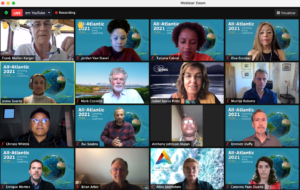
The Marine Biodiversity Observation Network (https://marinebon.org/) showcased the latest thinking for Advancing Collaborative Biodiversity Observations at the recent All-Atlantic2021 – All-Atlantic R&I for a Sustainable Ocean: Ministerial & Stakeholder Conference, from June 2 to June 4th, 2021. MBON responded to the All-Atlantic2021 Pledging Campaign, encouraging the creation of an All-Atlantic coordinated interoperable marine biodiversity observation system to inform policy and the society for sustainable use of ocean resources, in the spirit of the Galway and Belém Statements.
The MBON session on June 2, engaged more than 60 participants from all over the globe, to jointly “cooperate, connect and act” as a community of practice to observe life in the sea for operational and research purposes. To cooperate, participants from academia, early career professionals, the private sector, and civil society, across the Atlantic Ocean – from Pole to Pole – discussed how to strengthen links and empower ocean research and innovation. This included actions on: i) common practices for marine biodiversity observations and their integration with other ocean observations; ii) best practices sharing of marine biodiversity observations; iii) publication of key, select observations through open-access databases (e.g., OBIS); iv) informing policies and practices. Needs for biological observations and sustainable uses of the ocean connect the marine research community across the Atlantic. Acting together to develop pilot programs, capacity building efforts, coordination mechanisms, strengthening work relationships with policymakers, and identifying funding opportunities will help advance the connections and cooperation efforts. Rewards for working on these common activities include increased collaborations, participation in publications, joint funding, and the use and re-use of data. Examples of ocean basin projects included the MBON America P2P, IOCARIBE, the Atlantic Ocean Coupled Coastal Temperature and Biodiversity Observation Network (CCTBON), iAtlantic, AtlantOS, Marine Life 2030, Challenger 150, DOOS and GOOS, OBIS, etc. Examples of capacity building and networking discussed included the Africa COESSING school and the African Ocean Literacy Network in Nigeria. Example applications included a multitrophic shrimp farm in Cape Verde and detecting harmful algae blooms in the Benguela current. Gaps and lack of funding for developing countries were highlighted as well as the role of developed countries to advance technology and knowledge transfer. Some components include (1) streamlining to make measurements as inexpensive and accessible as possible and (2) developing training and community interactions in less-resourced regions.
